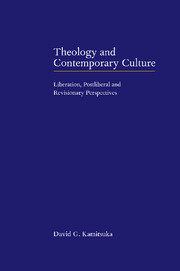Book contents
- Frontmatter
- Contents
- Acknowledgments
- Introduction
- 1 Values informing conceptions of theology
- 2 Apologetics and the linguistic-historical turn
- 3 Credibility in the pluralistic public realm
- 4 Reading the Bible theologically as the church's book
- 5 Pursuing doctrinal common ground
- 6 Virtues and vices in theological practice
- Select bibliography
- Index
1 - Values informing conceptions of theology
Published online by Cambridge University Press: 29 September 2009
- Frontmatter
- Contents
- Acknowledgments
- Introduction
- 1 Values informing conceptions of theology
- 2 Apologetics and the linguistic-historical turn
- 3 Credibility in the pluralistic public realm
- 4 Reading the Bible theologically as the church's book
- 5 Pursuing doctrinal common ground
- 6 Virtues and vices in theological practice
- Select bibliography
- Index
Summary
In analyzing revisionary, postliberal and liberation conceptions of theology, we enter into the midst of intermovement polemics. This might well be expected since conceptions of theology are informed by a host of complex theological judgments and values which take shape in relation to the wide-ranging intellectual, ecclesial and socio-political exigencies confronting theology in contemporary culture. Inevitably, theologians will read those demands differently, placing greater or lesser stress on various concerns and agendas which, in turn, affects the way they orient their theologies. The opportunities for differences and disputes abound. For example, Ogden believes that any adequate conception of theology today must value theology's task of assessing critically any and all Christian claims and, to do this fully, theology must have sufficient independence from the Christian witness on which it reflects. Without this value, theology is reduced to propaganda. The academic theological guild has fought long and hard to secure its freedom from being forced to be an arm of any group's imposition of belief, and this value would promote that intellectual freedom for theology. Frei's conception of theology values theology's ecclesial function of redescribing Christian communal attempts to render a habitable scriptural world. Without this value, theology is too easily absorbed into other semiotic systems with no distinctly Christian theological perspective to offer an increasingly secular, biblically illiterate and fragmented society. For Gutiérrez, theology adequately conceived must come to terms with the call for solidarity with the oppressed by responding to their material needs and attending to their spiritual wisdom.
- Type
- Chapter
- Information
- Theology and Contemporary CultureLiberation, Postliberal and Revisionary Perspectives, pp. 12 - 45Publisher: Cambridge University PressPrint publication year: 1999

